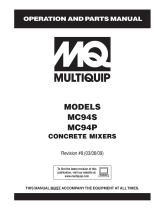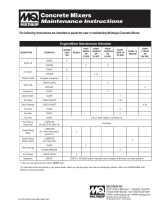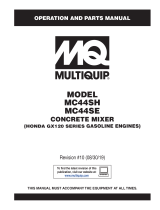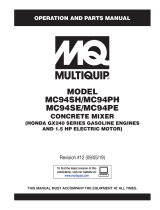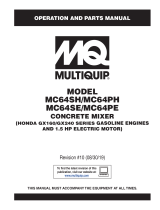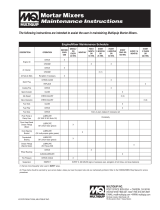Page is loading ...

OPERATION AND PARTS MANUAL
Revision #8 (09/15/11)
MC-44S
CONCRETE MIXER
THIS MANUAL MUST ACCOMPANY THE EQUIPMENT AT ALL TIMES.
To find the latest revision of this
publication, visit our website at:
www.multiquip.com

MC-44S CONCRETE MIXER — PROPOSITION 65 WARNING

MC-44S CONCRETE MIXER — OPERATION & PARTS MANUAL — REV. #8 (09/15/11) — PAGE 3
NOTE PAGE

PAGE 4 —MC-44S CONCRETE MIXER— OPERATION & PARTS MANUAL — REV. #8 (09/15/11)
MC-44S CONCRETE MIXER — TABLE OF CONTENTS
Componet Drawings
Nameplate and Decals....................................... 34-35
Mixer Assembly (Steel Drum) ............................ 36-37
Main Frame Assembly ....................................... 38-39
Axle Assembly .................................................... 40-41
Cabinet Assembly .............................................. 42-43
Gas Engine Mounting Plate Asasembly............ 44-45
Electric Motor Mounting Plate Asasembly ........ 46-47
Specification and part number
are subject to change without
notice.
NOTE
MULTIQUIP MC-44S
Concrete Mixer
Proposition 65 Warning ............................................. 2
Table Of Contents ..................................................... 4
Parts Ordering Procedures ....................................... 5
Specifications ............................................................ 6
Dimensions (Mixer) ................................................... 7
Safety Message Alert Symbols ................................. 8
Rules For Safe Operation .................................... 9-10
Operation and Safety Decals .................................. 11
General Information ................................................ 12
Mixer Basic Components ........................................ 13
Basic Engine Components ...................................... 14
Handwheel Assembly.............................................. 15
Towing Guidelines ................................................... 16
Safety Chain Connection ........................................ 17
Electric Motor ..................................................... 18-19
Pre-Inspection (Gasoline Engine) ........................... 20
Initial Start-up (Gasoline Engine) ............................ 21
Initial Start-up (Electric Motor) ................................ 22
Operation ................................................................ 23
Maintenance (Engine) ........................................ 24-25
Maintenance (Mixer) .......................................... 26-28
Troubleshooting (Engine) ........................................ 30
Troubleshooting (Engine/Mixer) .............................. 31
Explanation Of Code In Remarks Column .............. 32
Suggested Spare Parts ........................................... 33
HONDA GX120K1QX2 Engine
Air Cleaner Assembly......................................... 48-49
Camshaft Assembly ........................................... 50-51
Carburetor Assembly ......................................... 52-53
Control Assembly ............................................... 54-55
Crankcase Cover Assembly ............................... 56-57
Crankshaft Assembly ......................................... 58-59
Cylinder Barrel Assembly ................................... 60-61
Cylinder Head Assembly .................................... 62-63
Fan Cover Assembly .......................................... 64-65
Flywheel Assembly ............................................ 66-67
Fuel Tank Assembly ........................................... 68-69
Ignition Coil Assembly ........................................ 70-71
Muffler Assembly ............................................... 72-73
Piston Assembly ................................................. 74-75
Recoil Starter Assembly..................................... 76-77
Gasket Kit Assembly .......................................... 78-79
Labels Assembly ................................................ 80-81
Terms and Condition Of Sale
— Parts .................... 82

MC-44S CONCRETE MIXER — OPERATION & PARTS MANUAL — REV. #8 (09/15/11) — PAGE 5
PARTS ORDERING PROCEDURES
www.multiquip.com
Ordering parts has never been easier!
Choose from three easy options:
WE ACCEPT ALL MAJOR CREDIT CARDS!
When ordering parts, please supply:
❒ Dealer Account Number
❒ Dealer Name and Address
❒ Shipping Address (if different than billing address)
❒ Return Fax Number
❒ Applicable Model Number
❒ Quantity, Part Number and Description of Each Part
❒ Specify Preferred Method of Shipment:
✓ UPS/Fed Ex ✓ DHL
■ Priority One ✓ Tr u ck
■ Ground
■ Next Day
■ Second/Third Day
If you have an MQ Account, to obtain a Username
and Password, E-mail us at: parts@multiquip.
com.
To obtain an MQ Account, contact you
r
District Sales Manager for more information.
Order via Internet (Dealers Only):
Order parts on-line using Multiquip’s SmartEquip website!
■ View Parts Diagrams
■ Order Parts
■ Print Specification Information
Note: Discounts Are Subject To Change
Goto www.multiquip.com and click on
Order Parts
to log in and save!
Use the internet and qualify for a 5% Discount
on Standard orders for all orders which include
complete part numbers.*
Order via Fax (Dealers Only):
All customers are welcome to order parts via Fax.
Domestic (US) Customers dial:
1-800-6-PARTS-7 (800-672-7877)
Fax your order in and qualify for a 2% Discount
on Standard orders for all orders which include
complete part numbers.*
Order via Phone:
Domestic (US) Dealers Call:
1-800-427-1244
Best Deal!
International Customers should contact
their local Multiquip Representatives for
Parts Ordering information.
Non-Dealer Customers:
Contact your local Multiquip Dealer for
parts or call 800-427-1244 for help in
locating a dealer near you.
Note: Discounts Are Subject To Change
Effective:
January 1
st
, 2006
NOTICE
All orders are treated as Standard Orders and will
ship the same day if received prior to 3PM PST.

PAGE 6 —MC-44S CONCRETE MIXER— OPERATION & PARTS MANUAL — REV. #8 (09/15/11)
MC-44S CONCRETE MIXER — SPECIFICATIONS
)rotoMcirtcelE/enignE(snoitacificepS.1elbaT
cirtcelE/enignE
rotoM
ledoM2XQ1K021XGADNOH6955-423F43rodlaB
epyT
elgniS,ekorts4delooc-riA
tfahSlatnoziroH,VH
O,rednilyC
enignEenilosaG
511esahp-elgniS,PH2/1
rotoMcirtcelE,CAV
ekortSXeroB
.ni7.1X.ni7.2
)mm24xmm06(
A/N
t
nemecalpsiD)cc911(.ni.uc3.7A/N
tuptuOxaMmpr006,3/.P.H9.3.M.P.R5271/PH2/1
yticapaCknaTleuF)sretiL06.0(snollaG
.S.U36.0A/N
leuFenilosaGelibomotuAdedaelnUA/N
yticapaCliOebuL)retil6.0(.tq36.0A/N
lortnoCdeepS
dohteM
epyTthgie
w-ylFlagufirtneCA/N
dohteMgnitratStratSlioceRcirtcelE
egatloVtupnIA/NesahPelgniSCAV511
noisnemiD
)HxWxL(
.ni5.21X4.31x7.11
)mm813X143X792(
.ni26.8X65.7x78.31
)mm912X291X253(
thgieWteNyrD ).gK0.31(sbl7.82).gk4.5(sbl21.x
orppA
snoitacificepSrexiMS44-CM.2elbaT
thgieH )mm525,1(.ni06
htdiW )mm692,1(.ni15
htgneL )mm776,1(.ni66
yticapaCmurDmumixaM )sretil081(.tf.uc53.6
yticapaCgnixiMmumixaM )sretil311(.tf.uc4
yticapaCgaB )gab2/1ot3/1(
rotoMcirtcelE/enignEhtiW-thgieW ).gK422(.sbl594

MC-44S CONCRETE MIXER — OPERATION & PARTS MANUAL — REV. #8 (09/15/11) — PAGE 7
MC-44S CONCRETE MIXER — DIMENSIONS (MIXER)
See Table 2 for mixer dimensions
Figure 1. Mixer Dimensions

PAGE 8 —MC-44S CONCRETE MIXER— OPERATION & PARTS MANUAL — REV. #8 (09/15/11)
Accidental Starting
ALWAYS place the circuit breaker or power
ON/OFF switch in the OFF position when the
pump is not in use.
Respiratory Hazard
ALWAYS wear approved respiratory
protection.
Equipment Damage Messages
Other important messages are provided throughout this manual
to help prevent damage to your mixer, other property, or the
surrounding environment.
ALWAYS wear approved eye and hearing
protection.
Sight and Hearing hazard
MC-44S CONCRETE MIXER — SAFETY MESSAGE ALERT SYMBOLS
Safety precautions should be followed at all times when
operating this equipment. Failure to read and understand the
Safety Messages and Operating Instructions could result in
injury to yourself and others.
FOR YOUR SAFETY AND THE SAFETY OF OTHERS!
This Owner's Manual has been
developed to provide complete
instructions for the safe and
efficient operation of the Multiquip
Model MC-44S (Steel) Concrete
Mixer.
Before using these mixers,
ensure that the operating
individual has read and
understands all instructions in
this manual.
SAFETY MESSAGE ALERT SYMBOLS
The three (3) Safety Messages shown below will inform you
about potential hazards that could injure you or others. The
Safety Messages specifically address the level of exposure to
the operator, and are preceded by one of three words: DANGER,
WARNING, or CAUTION.
DANGER: You WILL be KILLED or
SERIOUSLY injured if you do not follow
directions.
WARNING: You CAN be KILLED or
SERIOUSLY injured if you do not follow
directions.
CAUTION: You CAN be injured if you
do not follow directions.
HAZARD SYMBOLS
Potential hazards associated with the Multiquip MC-44S
concrete mixer operation will be referenced with Hazard Symbols
which appear throughout this manual, and will be referenced in
conjunction with Safety Message Alert Symbols.
Rotating Parts
NEVER operate equipment with covers, or
guards removed. Keep fingers, hands, hair and
clothing away from all moving parts to prevent
injury.
NOTE
This mixer, other property, or the
surrounding environment could
be damaged if you do not follow
instructions.
NOTE

MC-44S CONCRETE MIXER — OPERATION & PARTS MANUAL — REV. #8 (09/15/11) — PAGE 9
MC-44S CONCRETE MIXER — RULES FOR SAFE OPERATION
■
ALWAYS refuel in a well-ventilated area, away from sparks
and open flames.
■
ALWAYS use extreme caution when working with flammable
liquids. When refueling, stop the engine and allow it to cool.
DO NOT
smoke around or near the machine. Fire or explosion
could result from fuel vapors, or if fuel is spilled on a hot
engine.
■
NEVER operate the mixer in an explosive
atmosphere or near combustible
materials. An explosion or fire could result
causing severe
bodily harm or even
death.
■
Topping-off to filler port is dangerous, as it tends to spill fuel.
■
Refer to the
Engine Owner's Manual
for engine technical
questions or information.
■
NEVER use accessories or attachments, which are not
recommended by Multiquip for this equipment. Damage to
the equipment and/or injury to user may result.
■
Manufacturer does not assume responsibility for any accident
due to equipment modifications.
■
NEVER touch the hot exhaust manifold,
muffler or cylinder. Allow these parts to
cool before servicing engine or mixer.
■
The engine of this mixer requires an adequate free flow of
cooling air.
NEVER!
operate the mixer in any enclosed or
narrow area where free flow of the air is restricted. If the air
flow is restricted it will cause
serious damage to the
mixer or engine and may
cause injury to people and
property. Remember the
mixer's engine (gasoline
models only) gives off
DEADLY gases.
■
High Temperatures – Allow the engine to cool before adding
fuel or performing service and maintenance functions. Contact
with
hot
components can cause serious burns.
DANGER:
Failure to follow instructions in this manual may
lead to serious injury or even death! This
equipment is to be operated by trained and
qualified personnel only! This equipment is for
industrial use only.
The following safety guidelines should always be used when
operating the Multiquip MC-44S Concrete Mixer:
GENERAL SAFETY
■
DO NOT operate or service this equipment before
reading this entire manual.
■
This equipment should not be operated by
persons under 18 years of age.
■
NEVER operate this equipment without proper
protective clothing, shatterproof glasses, steel-
toed boots and other protective devices required
by the job.
■
NEVER operate this equipment when not feeling
well due to fatigue, illness or taking medicine.
■
NEVER operate this equipment under the
influence or drugs or alcohol.
■
Whenever necessary, replace nameplate, operation and
safety decals when they become difficult read.
■
ALWAYS check the machine for loosened threads or bolts
before starting.
■
ALWAYS wear proper respiratory (mask) hearing and eye
protection equipment when operating the mixer.
■
NEVER!
place hands inside the drum while the drum is
rotating.

PAGE 10 —MC-44S CONCRETE MIXER— OPERATION & PARTS MANUAL — REV. #8 (09/15/11)
■
In emergencies
always
know the location of the
nearest phone or
keep a phone on the job site
.
Also know the phone numbers of the nearest
ambulance
,
doctor
and
fire department
. This
information will be invaluable in the case of an
emergency.
■
NEVER disconnect any
"emergency or safety devices"
.
These devices are intended for operator safety. Disconnection
of these devices can cause severe injury, bodily harm or even
death! Disconnection of any of these devices will void all
warranties.
■
If mixer is equipped with an electric motor, operate electric
motor only at the specified voltage indicated on the nameplate.
■
Make sure the
OFF/ON
power switch on the electric motor is
always
in the
OFF
position before inserting the mixer's power
plug into an AC receptacle (electric model only).
Maintenance Safety
■
NEVER lubricate components or attempt service on a running
machine.
■
ALWAYS allow the machine a proper amount of time to cool
before servicing.
■
Keep the machinery in proper running condition.
■
Fix damage to the machine immediately and always replace
broken parts, or missing decals.
■
Dispose of hazardous waste properly. Examples of potentially
hazardous waste are used motor oil, fuel and fuel filters.
■
DO NOT use food or plastic containers to dispose of
hazardous waste.
■
DO NOT pour waste, oil or fuel directly onto the ground,
down a drain or into any water source.
Emergencies
■
ALWAYS know the location of the nearest
fire extinguisher
and first aid kit.
MC-44S CONCRETE MIXER — RULES FOR SAFE OPERATION
■
NEVER run engine without air cleaner. Severe engine damage
may occur.
■
ALWAYS read, understand, and follow procedures in
Operator’s Manual before attempting to operate equipment.
■
ALWAYS be sure the operator is familiar with proper safety
precautions and operations techniques before using roller.
■
ALWAYS store equipment properly when it is not being used.
Equipment should be stored in a clean, dry location out of the
reach of children.
■
NEVER leave the mixer unattended, turn off engine or electric
motor when unattended.
■
CAUTION must always be observed while servicing this mixer.
Rotating parts can cause injury if contacted.
■
Unauthorized equipment modifications will void all
warranties.
■
Ensure that any extension cable is protected against damage
and not liable to be tripped over or trapped underneath the
mixer.
■
DO NOT allow extension cord to come into contact with water
or fluids.
■
DO NOT spray water onto electric motor.
■
This mixer is intended for the production of concrete. Mixer
must be used only for its intended purpose.
■
This mixer is not suitable for the mixing of
flammable
or
explosive
substances.
■
NEVER operate the mixer in an
explosive
atmosphere.
■
Before starting the mixer, check that all
guards
are in position
and correctly fitted.
■
Keep area around the mixer
clear of obstructions
which
could cause persons to fall onto
moving parts
.
■
ALWAYS ensure mixer is on level ground before mixing.
■
Become familiar with the controls of the mixer before
operating.
■
ALWAYS replace any worn or damaged warning decals.
■
Ensure the drum is
rotating
while filling and emptying the
drum.
■
ALWAYS disconnect AC power plug from power source
before moving mixer (electric model only).
■
High Temperatures – Always stop engine and allow the
engine to cool before adding fuel, oil or performing service
and maintenance functions. Contact with
hot
components
can cause serious burns.

MC-44S CONCRETE MIXER — OPERATION & PARTS MANUAL — REV. #8 (09/15/11) — PAGE 11
MC-44S CONCRETE MIXER — OPERATION AND SAFETY DECALS
Machine Safety Decals
The Multiquip MC-44S mixer is equipped with a number of safety decals (Figure 1A). These decals are provided for operator safety
and maintenance information. The illustration below and on the next page shows these decals as they appear on the machine.
Should any of these decals become unreadable, replacements can be obtained from your dealer.
Figure 1A. MC-44S Mixer Decals

PAGE 12 —MC-44S CONCRETE MIXER— OPERATION & PARTS MANUAL — REV. #8 (09/15/11)
MC-44S CONCRETE MIXER — GENERAL INFORMATION
Application
This mixer is
only
intended for the production of
concrete
.
The mixer must be used for its intended purpose and is not
suitable for the mixing of
flammable
or
explosive
substances. The mixer
must not be used
in an explosive
atmosphere. Use Table 4 (Mixing Hints) as a guide when
mixing concrete for various applications.
Power Plants
The Multiquip MC42-S mixer can be powered by either a
Honda GX120K1QX2 air-cooled, 4-stroke
gasoline engine or
a 1/2 HP electric motor. Refer to Table 2 to for specific engine
or electric motor data information.
Electrical
If mixer is equipped with an
electric motor
, make sure that
the power being supplied to the motor corresponds to the
voltage rating label on the motor. Supplying the wrong voltage
to the electric motor will cause severe electrical damage to
the motor.
Always make sure the
OFF/ON
switch on the electric motor
is in the
OFF
position before applying power.
It is
strongly recommended
when inserting the mixer's
power cord into a receptacle, that a G.F.C.I. (
Ground Fault
Current
Interrupter
) receptacle be used (115 VAC
applications).
Extension Cables
The extension cable should be a 3-wire configuration that
includes a ground wire that conforms to UL code. The wire
cross section must be a minimum of 2.5 mm
2
. Choose an
extension cord of adequate current carrying capacity as ref-
erenced in Table 5. Remember
distance
affects the wire
size of the extension cable.
Ensure that the extension cable is carefully laid out avoid-
ing
wet areas
,
sharp edges
and locations where vehicles
might run over it. Avoid allowing the extension cable to be
trapped underneath the mixer.
Unroll the extension cable fully or it will overheat and could
catch fire. Make sure that all extension cable connections
are dry and safe. Replace any defective or badly worn ex-
tension cable immediately.
Hardware
Check all hardware on the mixer before starting. Periodically
inspect all hardware. Loose hardware can contribute to early
component failure and poor performance. Use Table 3 as general
guideline when the torqueing of mixer hardware is required.
Remember to keep all mixer hardware components tight.
Engine Maintenance
For basic engine maintenance, refer to the engine maintenance
section in this manual. For a more detailed engine maintenance,
refer to the
Honda
Engine Owner's manual furnished with the
engine.
euqroTerawdraH.3elbaT
noitadnemmoceR s
erawdraH
retemaiD
)sbl-tf(euqroT
81xhcni-61/541
61xhcni-8/342
42xhcni-8/
373
31xhcni-2/193
31xhcni-2/1
)8edarG(
09
STNIHGNIXIM.4elbaT
SNOITACILPPA
XIM
SOITAR
SEITITNAUQHCTAB
HCTAB.XORPPA
TUPTUO
.sbl211TNEMEC
).sgK05(
gaB
DNASENOTS
.TF.UCRTL.TF.UCRTL.
TF.UCRTL
yranidrOtsoM
4:2:1GAB2/14/1-1532/1-2173 58
snoitadnuoF
6:3:1GAB3/14/1-1532/1-2174/3-287
ssaMhguoR
etercnoC
8:4:1GAB4
/14/1-1532/1-2174/3-287
,sroolFthgitretaW
.ctE,stiP,sknaT
3:2/1-1:1GAB3/24/1-1533 173 58

MC-44S CONCRETE MIXER — OPERATION & PARTS MANUAL — REV. #8 (09/15/11) — PAGE 13
MC-44S CONCRETE MIXER — MIXER BASIC COMPONENTS
1. Steel Mixing Drum — The Multiquip MC-44S concrete
mixer uses a 4 cu. ft
steel
mixing drum. This drum is to be
used for mixing of concrete. Always clean the drum after
each use. DO NOT use this mixing drum for the mixing of
volatile liquids.
2. Dump Latch — To rotate the mixing drum, this latch must
be in the up position. To lock the drum, place the latch in the
down position.
3. Dump Gear Guard — NEVER operate the mixer with this
guard removed. Its purpose is to prevent dirt and debris
from entering the dump gear. In addition operator clothing
could become entangled in the dump gear, causing severe
injury and bodily harm.
4. Handwheel — Turn this wheel clockwise or counter-
clockwise to rotate the mixing drum. Remember the dump
latch must be in the
up position
in order for the mixing
drum to be rotated.
5. Zerk Fittings — There is, at the bottom and engine side
of the yoke, and center of the
handwheel
grease zerk
fittings. Lubricate these fittings as referenced in the
maintenance section of this manual.
6. Safety Chain — This mixer uses a 3/16-inch thick, 72-
inches long zinc-plated saftey chain.
ALWAYS
connect the
safety chain when towing.
7. Tow Bar — This mixer uses various towing bars, please
reference the frame assembly drawing and parts list in this
manual to determine which tow bar meets your
requirements.
8. Rigid Suspension — This mixer uses a rigid type
suspension. Check the mounting hardware for bolt hole
elongation and tightness. See maintenance section of this
manual for recommended maintenance.
9. Chock Blocks — Place these blocks (not included as
part of the mixer package) under each mixer wheel to
prevent rolling, when mixer is not connect to the towing
vehicle.
10. Tires Ply — The tire ply (layers) number is rated in letters;
This mixer uses 13-inch 2-ply tires. Replace with only
recommended type tires.
11. ON/OFF Switch (gasoline only) — This switch is provided
on
mixer with gasoline
engines only and is located on the
side of the mixer frame. When activated it will shut down
the engine. Pull out when starting the engine.
12. Cabinet/Latch — Encloses engine and electric motor.
NEVER run mixer with cabinet removed. Use latches to
secure engine compartment cabinet.
13. Mixing Blades (Steel) — Used for the mixing of concrete.
When blades show signs of wear, entire steel mixing drum
assembly must be replaced. See steel mixing drum
assembly in the parts section of this manual.
14. Forklift Pockets – When lifting of the mixer is required,
use these fork lift pockets to lift the mixer. Remember to
insert the forks of the forklift a minimum of 24 inches into
the lift pockets.
Figure 2. Mixer Major Components

PAGE 14 —MC-44S CONCRETE MIXER— OPERATION & PARTS MANUAL — REV. #8 (09/15/11)
MC-44S CONCRETE MIXER — BASIC ENGINE COMPONENTS
Figure 3. Engine Controls and Components
INITIAL SERVICING
The engine (Figure 3) must be checked for proper lubrication and
filled with fuel prior to operation. Refer to the manufacturers Engine
manual for instructions & details of operation and servicing.
1. Fuel Filler Cap – Remove this cap to add unleaded
gasoline to the fuel tank. Make sure cap is tightened
securely. DO NOT over fill.
Adding fuel to the tank should be accomplished only
when the engine is stopped and has had an
opportunity to cool down. In the event of a fuel spill,
DO NOT attempt to start the engine until the fuel residue has been
completely wiped up, and the area surrounding the engine is dry.
2. Throttle Lever – Used to adjust engine RPM speed (lever
advanced forward
SLOW
, lever back toward operator
FAST
).
3. Engine ON/OFF Switch – ON position permits engine
starting, OFF position stops engine operations.
4. Recoil Starter (pull rope) – Manual-starting method. Pull
the starter grip until resistance is felt, then pull briskly and
smoothly.
5. Fuel Valve Lever – OPEN to let fuel flow, CLOSE to stop
the flow of fuel.
6. Choke Lever – Used in the starting of a cold engine, or in
cold weather conditions. The choke enriches the fuel
mixture.
7. Air Cleaner – Prevents dirt and other debris from entering
the fuel system. Remove wing-nut on top of air filter
cannister to gain access to filter element.
8. Spark Plug – Provides spark to the ignition system. Set
spark plug gap to 0.6 - 0.7 mm (0.028 - 0.031 inch). Clean
spark plug once a week.
9. Muffler – Used to reduce noise and emissions.
Engine components can generate extreme heat.
To prevent burns, DO NOT touch these areas
while the engine is running or immediately after operating. NEVER
operate the engine with the muffler removed.
10. Fuel Tank – Holds unleaded gasoline. For additional
information refer to engine owner's manual.
WARNING
WARNING
NOTE
Operating the engine without an air filter,
with a damaged air filter, or a filter in need of
replacement will allow dirt to enter the
engine, causing rapid engine wear.
WARNING
Honda GX Series Engine Shown

MC-44S CONCRETE MIXER — OPERATION & PARTS MANUAL — REV. #8 (09/15/11) — PAGE 15
MC-44S CONCRETE MIXER — HANDWHEEL ASSEMBLY
Assembly
The Multiquip MC-44S concrete mixer is shipped with the
handwheel detached. Attach the handwheel to the mixer as
shown in Figure 4.
Figure 4. Handwheel Assembly

PAGE 16 —MC-44S CONCRETE MIXER— OPERATION & PARTS MANUAL — REV. #8 (09/15/11)
MC-44S CONCRETE MIXER — TOWING GUIDELINES
To reduce the possibility of an accident while transporting
the mixer on public roads, always make sure that the mixer
towing components and the towing vehicle are in good
operating condition and both units are mechanically sound.
The following list of suggestions should be used when towing
the mixer:
CAUTION:CAUTION:
CAUTION:CAUTION:
CAUTION:
Towing Safety Precautions
■
Check with your county or state safety
towing regulations department before
towing your
mixer
.
■
Make sure that the hitch and coupling of the towing vehicle
are rated equal to, or greater than the trailer "gross vehicle
weight rating" (GVWR).
■
ALWAYS inspect the hitch and coupling for wear. NEVER
tow the mixer with defective hitches, couplings, chains etc.
■
CHECK the tire air pressure on both the towing vehicle and
the trailer. Also check the tire tread wear on both vehicles.
■
ALWAYS make sure the mixer is equipped with a "Safety
Chain".
■
ALWAYS attach trailer's safety chain to the frame of towing
vehicle.
■
ALWAYS make sure that the towing vehicle's directional,
backup, and brake lights are working properly.
■
Remember in most cases the maximum speed unless
otherwise posted for highway towing is 45 MPH, however
before towing your mixer, check your local state, and county
vehicle towing requirements. Recommended off-road towing
is not to exceed 10 MPH or less depending on type of terrain.
■
Place
chocked blocks
underneath wheels to prevent
rolling,
while parked, if disconnected from towing vehicle.
■
Inflate tires to correct pressure, inspect tires for cuts, and
excessive wear. See Table 16 (Tire Wear Troubleshooting).
■
When towing of the mixer is required, place the drum in the
up position (mouth facing upwards).
■
ALWAYS make sure that the fuel valve lever is in the OFF
position (gasoline models only).
CAUTION:CAUTION:
CAUTION:CAUTION:
CAUTION:
If the mixer tow bar is deformed or damaged
replace entire tow bar. NEVER tow the mixer
with a defective tow bar. There exist the
possibility of the trailer separating from the
towing vehicle.
Tow Bar to Vehicle Connection (Coupler Only)
1. Check the vehicle hitch ball, and mixer's coupler for
signs of wear or damage. Replace any parts that are
worn or damaged before towing.
2. Use only a 2-inch ball diameter (towing vehicle), this
will match the mixer's 2-inch coupler. Use of any other
ball diameter will create an extremely dangerous condition
which can result in separation of the coupler and ball or
ball failure.
3. After tow bar has been connected to mixer (see next
page), attach mixer's coupler to the hitch ball on the
towing vehicle securely and make sure the lock lever
is in the down position (locked).
Mixer Tow Bar Vehicle Connection (Pintle and Loop)
1. Make sure the bumper on the towing vehicle is
equipped to handle either a pintle or loop type tow
bar configuration.
2. After tow bar has been connected to mixer (see next
page), secure either type of tow bar to the towing vehicle,
following state and county towing regulations.
3. As a minimum, use a 1/2-inch bolt and nylock nut grade
5 when securing either tow bar to the towing vehicle,
■
Check wheel mounting lug nuts with a torque wrench.
Torque wheel lug nuts as described in the maintenance
section of this manual.
■
Check tightness of U-clamp nuts, torque suspension
hardware as referenced in the maintenance section of this
manual.
■
Avoid sudden stops and starts. This can cause skidding, or
jackknifing. Smooth, gradual starts and stops will improve
gas milage.
■
Avoid sharp turns to prevent rolling.

MC-44S CONCRETE MIXER — OPERATION & PARTS MANUAL — REV. #8 (09/15/11) — PAGE 17
MC-44S CONCRETE MIXER — SAFETY CHAIN CONNECTION
NEVER ! tow the mixer with the safety chain
removed. The safety chain is intended to
prevent complete separation of the mixer from
the towing vehicle in the event of a tow bar
failure.
CAUTION:CAUTION:
CAUTION:CAUTION:
CAUTION:
Reference Figure 5 for the installation of the
Safety Chain
.
Tow Bar to Mixer Connection
1. Insert the tow bar through the round opening at the
bottom of the mixer stand.
Align the hole on the tow bar with the hole on the mixer
frame, and insert 1/2-inch bolt through tow bar and frame.
Secure tow bar to frame with 1/2-inch nylock nut. Tighten
to 40 ft.-lbs.
2. Route the safety chain through the holes just above the
tow bar, located on each side of the mixer stand.
Loop the chain together and place under the tow bar.
Secure the loop with the connector link.
3. Extend the safety chain along the length of the tow bar,
looping it through the tow bar's connector link. Remove
any excess chain slack.
4. Connect the free end of (clevis safety hook) the safety
chain to the towing vehicle.
Remember it is critical
that the length of the chain be properly adjusted
, to
prevent the
draw bar
and the front of the mixer stand
from dropping to the the ground (contact) in the event
the draw bar becomes disconnected from the towing
vehicle.
Figure 5. Tow Bar and Safety Chain Installation

PAGE 18 —MC-44S CONCRETE MIXER— OPERATION & PARTS MANUAL — REV. #8 (09/15/11)
MC-44S CONCRETE MIXER — ELECTRIC MOTOR
Electric Motor
For maintenance care and operation of the electric motor, refer
to your electric motor instruction booklet furnished with the electric
motor.
Protect the electric motor from dust as much as possible and
keep ventilating openings clean.
The electric motor used in this mixer is a single-phase 1.5 HP
motor. The input voltage requirement for this motor is either 115
or 230 VAC only.
Electric Motor Connection
A 12 inch electrical cable (Figure 2) with a pigtail at one end is
provided with the electrical motor for hookup to a power source.
Table 1. shows the required NEMA connector for the desired
motor horsepower rating. In addition, Table 2 also shows the
matching NEMA approved connector for the required extension
cord.
ALWAYS
, make certain that the power source required for the
electric motor is
correct
and always use the correct NEMA
configuration plug.
Failure
to supply the correct voltage to the
motor can severely damage the motor.
The electric motor supplied with the mixer is configured from the
factory for 115 VAC grounded operation. Make certain that the correct
size grounded (3-wires) extension cord is used. See Table 5.
Motors can burn out when the line voltage falls 10% below the
voltage rating of the motor. Failure to use proper voltage will
cause the motor to overheat and actuate the overload switch.
If overload protection should actuate because of improper voltage
or any other malfunction, turn the main switch on the motor to the
"OFF" position and correct the problem, press the reset switch
button, and turn the main switch to the "ON" position.
CAUTION:
■
DO NOT spray water at any time on the
electric motor
.
■
DO NOT operate electric motor in a
explosive environment.
Electric Motor Voltage Change Switch
1.
ALWAYS
make certain the electric motor's ON/OFF switch
is in the "OFF" position and the power cord has been
disconnected from the power source.
NOTE
NEVER!
disable or disconnect the
ON/OFF switch on the electric motor.
It is provided for operator safety. Injury
may result if it is disable, disconnected
or improperly maintained.
seziSdroCnoisnetxEdednemmoceR.5elbaT
cirtcelE
rotoM
tupnI
egatloV
.tf05
)m42.51(
.tf57
)m68.22(
.tf001
)m84.03(
.tf002
)m69.06(
PH2/1CAV51121.oN01.oN8.oN6.
oN

MC-44S CONCRETE MIXER — OPERATION & PARTS MANUAL — REV. #8 (09/15/11) — PAGE 19
Figure 6. Single Phase Electric Motor with 12 inch Pigtail Cable
MC-44S CONCRETE MIXER — ELECTRIC MOTOR

PAGE 20 —MC-44S CONCRETE MIXER— OPERATION & PARTS MANUAL — REV. #8 (09/15/11)
MC-44S CONCRETE MIXER — PRE-INSPECTION (GAS ENGINE)
Figure 7. Engine Oil Dipstick (Removal)
3. Insert and remove the dipstick without screwing it into the
filler neck. Check the oil level shown on the dipstick.
4. If the engine oil level is low (Figure 8), fill to the edge of
the oil filler hole with the recommended oil type (Table 6).
See Table 2 for the oil capacity of your type engine.
Figure 8. Engine Oil Dipstick (Oil Level)
Fuel Check
If your mixer has a gasoline engine, determine if the engine fuel
is low. If fuel is low, remove the fuel filler cap and fill with
unleaded
gasoline. Motor fuels are highly flammable and can be dangerous
if mishandled. DO NOT smoke while refueling. DO NOT attempt
to refuel the trowel if the engine is
hot!
or
running
.
1. Remove the gasoline cap located on top of fuel tank.
2. Visually inspect to see if fuel level is low. If fuel is low, replenish
with unleaded fuel.
3. When refueling, be sure to use a strainer for filtration. DO
NOT top-off fuel. Wipe up any spilled fuel.
V-belt Check
A worn or damaged V-belt can adversely affect the performance
of the mixer. If a V-belt is defective or worn simply replace the V-
belt as outlined in the maintenance section of this manual.
Blade Check
Check for worn blades. If using a steel tub and the blades are
worn, replace the entire tub assembly. Remember the blades
are welded to tub.
If using a plastic tub, replace the blades using the part numbers
referenced in the parts section of this manual.
Start/Stop Switches
This mixer has been equipped with a start/stop switches for both
the gasoline and electric motor mixers. These switches should be
tested every time the engine or motor is started.
Grease Fittings (Zerk)
Check the zerk grease fittings (Figure 26) as shown in the
maintenance section of this manual. These grease fittings lubricate
the
handwheel
and the
yoke mechanism
.
Explosive Fuel
Before Starting
1. Read safety instructions at the beginning of manual.
2. Clean the
mixer
, removing dirt and dust, particularly the
engine cooling air inlet, carburetor and air cleaner.
3. Check the air filter for dirt and dust. If air filter is dirty, replace
air filter with a new one as required.
4. Check carburetor for external dirt and dust. Clean with dry
compressed air.
5. Check fastening nuts and bolts for tightness.
Engine Oil Check
1. To check the engine oil level, place the mixer on
secure level ground with the engine stopped.
2. Remove the filler dipstick from the engine oil filler hole
(Figure 7) and wipe it clean.
epyTliO.6elbaT
nosaeS erutarepmeT epyTliO
remmuS rehgiHroC°52 03-W01EAS
llaF/gnirpS C°01~C°52 02/03-W01EAS
retniW rewoLroC°0 01-W01EAS
/
